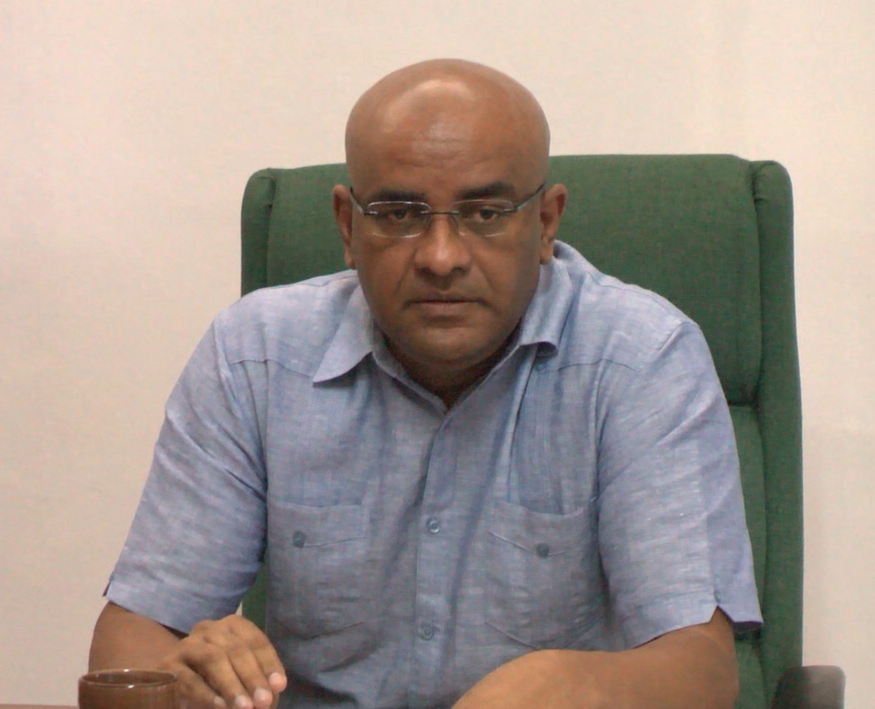… says will put Amerindians, Afro-Guyanese in conflict
Given the complicated nature of the Commission of Inquiry (CoI) which will be looking into ancestral lands and other land matters, Opposition Leader Bharrat Jagdeo, has advised members of the public not to take part in the process, as it only seeks to bring division among Guyanese.
Addressing a press conference on Friday at his Church Street, Georgetown office, Jagdeo told media operatives that the CoI will not solve a single-issue people face on the ground, describing it as another ‘political gimmick’ that is intended to cause racial division.
The former Head of State said given this fact, Guyana may never achieve its objective of bringing its people together across all racial lines. He opined that the land CoI in its current form, to a large extent, will put Amerindians and Afro-Guyanese at conflict with each other.
“Most people in Guyana, ordinary people have gone pass that, have gone pass those issues. But now in this racially inflammatory way… they are putting out who came before whom, and who has too much etcetera,” he said.
Jagdeo also believes that the CoI is being used to generate a feeling among Afro-Guyanese that the coalition Government defends their interest. He feels Government is doing this because they recognise that people, who supported them including many Afro-Guyanese, are very disappointed with their performance.
He lashed out at Government for allegedly attempting to ‘play the race card’ again, instead of focusing on policy.
“So you say that you defend interest, but it’s not going to happen in the future. If you come up with the African ancestral lands, that’s why at the beginning I asked how a report would help a young kid in South Georgetown who has no job or who is looking for a job. Will he get land?”
The Opposition Leader also believes that the land CoI is just another means by which Government is trying to create what he dubbed “jobs for the boys.” “This is a wedge issue,” he added, stating that Afro-Guyanese have more land today at their disposal than they had in 1992.
In making reference to comments made by the Guyana Reparations Committee, which is chaired by Dr Eric Phillips, in relation to Africans being in Guyana before three Amerindian tribes who have been given titles to their lands, embraces the same views made by Minister Keith Scott.
The Minister within the Communities Ministry had told Parliament that Amerindians are “greedy” and that the National Toshaos Council (NTC) had made it clear that it was not satisfied with the lands already given to them some (24 per cent of lands) leaving nothing for Afro-Guyanese. However, Scott has refused to apologise to the Amerindian community.
In April, the Opposition People’s Progressive Party’s (PPP) motion calling for the revocation of the appointment of the Lands CoI was shut down by the Speaker of the House, Dr Barton Scotland as he deemed it ‘not urgent,’ although the Opposition claimed it was of national public importance.
The Opposition has been calling on President David Granger to hold consultations with all the relevant stakeholders in order to determine a course of action that would accelerate the issuance of title to Amerindians for traditional lands and address all matters in relation to that issue.
The NTC had rejected Government’s decision to establish the CoI into land rights, on the grounds of lack of consultation and that the two issues – lands acquired by free Africans, along with Amerindian land titling issues – are unique and need to be addressed separately.
“While we support reparations and repatriation of African Lands and addressing that issue with a great degree of urgency, the Indigenous land issue cannot and should not be viewed in the same light, nor can it be addressed under the same framework,” the Council had said in a statement.
The NTC called for the establishment of two separate entities to deal with the two different issues as it voiced its refusal to cooperate with the current land CoI.
The organisation noted that failure to do so would demonstrate that Guyana’s Indigenous peoples are being marginalised by Government. The NTC also highlighted that in the Amerindian Act of 2006, as a matter of law, there exists a process that speaks to the issue of Amerindian Lands.
Several Amerindian organisations, including the Amerindian Peoples Association (APA) have maintained strong objections to the land rights CoI, stating that the Terms of Reference (ToR) of the CoI were vague, as they did not define clear objectives of addressing the issue of communal lands belonging to Amerindians and, as such, the organisation is calling for them to be reviewed.
